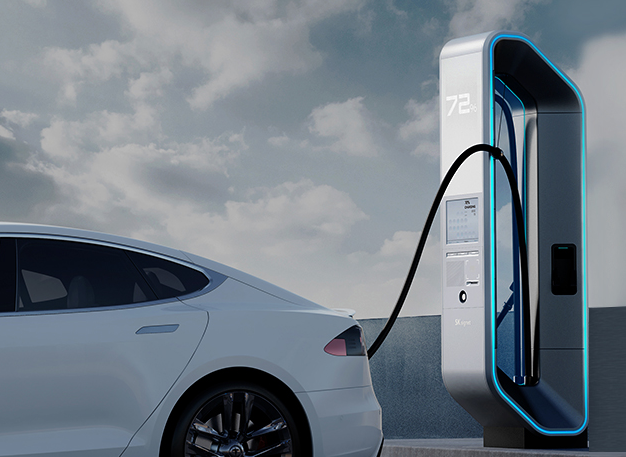Electric vehicles
SK seeks to build EV charger plant in US on subsidies
The US House is set to pass bill including higher subsidies for EV charger to $100,000 in a move to help SK Signet secure profitability
By Aug 11, 2022 (Gmt+09:00)
3
Min read
Most Read
LG Chem to sell water filter business to Glenwood PE for $692 million


Kyobo Life poised to buy Japan’s SBI Group-owned savings bank


KT&G eyes overseas M&A after rejecting activist fund's offer


StockX in merger talks with Naver’s online reseller Kream


Mirae Asset to be named Korea Post’s core real estate fund operator



SK Group, South Korea’s No. 2 conglomerate, is seeking to build an electric vehicle charger plant in the US in a move to accelerate the expansion of its presence in the world’s third-largest EV market as Washington is poised to increase subsidies for the charging infrastructure.
SK Signet Inc., the world’s second-largest EV charger maker, is expected to speed up its plan to set up a factory there as the US Democrat-controlled House is expected to approve the Inflation Reduction Act on Aug. 12, which contains measures to raise subsidies for EV charger to up to $100,000 per unit. The Senate passed the bill on Aug. 6.
Currently, the US government provides grants of up to $40,000 a unit or 30% of the costs of the charging equipment.
SK Signet, an EV charger manufacturing subsidiary of the group’s holding company SK Inc., has been examining the profitability of a new plant in the US since the beginning of this year.
The company needs measures to cut expenses as production in the country costs more with prices for parts up 50% compared to those in South Korea. Component expenses usually make up about half the total production cost as EV chargers are manufactured by assembling parts.
The bill is predicted to help SK Signet secure profitability from the potential US factory, industry sources said.
SK Signet already accounted for about 50% of the US ultra-fast charger market, providing products of 150 kilowatts (kW) and 350 kW outputs to the country’s No. 1 and No. 2 service providers Electrify America and EVgo.
The South Korean company currently produces about 3,000 EV chargers from a plant in Yeonggwang, about 300 kilometers south of Seoul.
SK Signet EV charger production volume
Unit: unit

Source: SK Signet
Graphics by Jerry Lee
Its sales jumped about 30% to 79.9 billion won ($61.4 million) last year from 2020 as demand for EV charging infrastructure grew worldwide.
SK Signet sales
Unit: billion won

Source: SK Signet
Graphics by Jerry Lee
US EXPANSION
SK Signet CEO Shin Jung Ho unveiled its ambition to expand its US business late last month.
“We are pushing ahead with a production factory in the US for business there,” Shin told investors. “We will announce the investment plan through the board of directors.”
SK Signet America President Oh Seung June even attended a videoconference meeting between US President Joe Biden and SK Chairman Chey Tae-won last month.
“Oh had not been on the participant list, but his attendance was decided the day before the meeting,” said an industry source. “He appeared in public to induce state governments to provide incentives and others.”
Global EV charger makers such as Australia-based Tritium rushed to build production bases in the US. Local plants usually help those makers win more orders as they can manufacture tailored products required by each automaker.
SK Group has been actively expanding its presence in industries for the US EV sector.
SK Inc. has committed to invest $5 million in US electric vehicle charging stations manufacturer FreeWire Technologies in April.
In March, SK E&S Co., the group’s natural gas business unit, acquired US electric vehicle charging solution provider EverCharge Inc.
SK On Co., the group’s EV battery maker, is building factories there with a target to increase its capacity to 150 gigawatt-hours (GWh) in total by 2026 to meet the growing demand in the market.
Write to Hyung-Kyu Kim at khk@hankyung.com
Jongwoo Cheon edited this article.
More to Read
-

-
 Electric vehiclesSK, BlackRock team to bet on EV charging station maker
Electric vehiclesSK, BlackRock team to bet on EV charging station makerApr 29, 2022 (Gmt+09:00)
2 Min read -
 Mergers & AcquisitionsSK E&S buys EverCharge to enter US EV charging market
Mergers & AcquisitionsSK E&S buys EverCharge to enter US EV charging marketMar 25, 2022 (Gmt+09:00)
1 Min read
Comment 0
LOG IN


